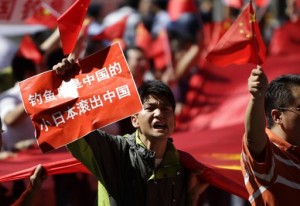Special to WorldTribune.com
By Brian M Downing, FreePressers.com
The dispute between China and Japan over the Senkakus group of uninhabited islands and barren rocks jutting up from the East China Sea has intensified in recent days. China has sent armed vessels to the island and anti-Japanese demonstrations have broken out in Chinese cities.
Japan has retaliated economically by curtailing orders from Chinese factories. The conflict reveals much about the emerging geopolitical contest along China’s periphery — and perhaps also a little about the country’s internal politics.

The conflict is far more than between only Japan and China. The latter’s less-than-peaceful assertions of national sovereignty along its periphery and its association with the mercurial North Korean dictators have caused concern with South Korea, Taiwan, the Philippines, Vietnam, and India, which collectively have a great deal of economic and military power. And behind them, of course, is U.S. support.
It is unlikely that Japan’s curtailment of orders from Chinese factories has been done without prior coordination with other regional powers, some of whom also use Chinese factory labor and are likely willing to curtail their orders from China should tensions worsen. They may be willing to turn to Southeast and South Asia, where labor costs are low and concerns about China high.
This underscores China’s vulnerabilities.
For all its economic growth and military spending, the country is perilously dependent on demand from foreign countries, many of which are now rethinking their longterm relations with China. If China wishes to make the transition from low-wage labor and foreign exports to higher-wage labor and increased domestic consumption, it must take care not to damage its relationships with East Asia, South Asia, and the U.S., lest its economy stall. This will dismay tens of millions of young people in the now-booming cities who see richer consumer lifestyles on the horizon.
Tensions with Japan, and obliquely with many other neighbors, are taking place amid Russian moves to strengthen its position in world affairs, especially by inserting itself as a crucial and perhaps decisive balancer between the U.S. and China.
Russia is seeking naval bases in Vietnam and the Seychelles, both of which lie along China’s sea lanes to vital commodities in the Persian Gulf and Africa. Even the most confident of growing powers cannot ignore ominous geopolitical realities — and its own missteps in coalescing them as well.
Internal Chinese politics is less opaque than in the days of Mao Zedong, but the cliques in the one-party state are not well known. This is increasingly obvious with the recent criminal charges against party chieftain Bo Xilai and the disappearance of Xi Jinping, the presumed next president. Observers get glimpses of factions supporting a more muscular stance in the world and those supporting continued emphasis on economic power.
The Chinese state is divided between an old elite based on heroic military-revolutionary myths and a new one based on uninspiring business and economic models.
Business-oriented parts of China’s leadership will attempt to convince the guardians of national prestige that today there are few areas around the world to establish hegemony over and that most weak countries are skillfully forging protective alliances.
The quest for power prestige is best left to a navalist and imperialist past that ultimately led to destructive wars and weakened economies. Military-oriented parts will contend that the economic path leads inevitably to materialism, dishonor, and the political and social woes now plaguing western societies.
It will be interesting to see to what extent each faction, bourgeois and military, will turn to the public for support or if each side will deftly avoid any tactic that will allow greater voice for the public in national affairs. Neither faction, after all, wants to stir up democratic forces, but it remains to be seen if either is capable of asserting itself over the other without garnering popular support.
Brian M Downing is a political/military analyst and author of The Military Revolution and Political Change and The Paths of Glory: War and Social Change in America from the Great War to Vietnam. He can be reached at brianmdowning@gmail.com.
